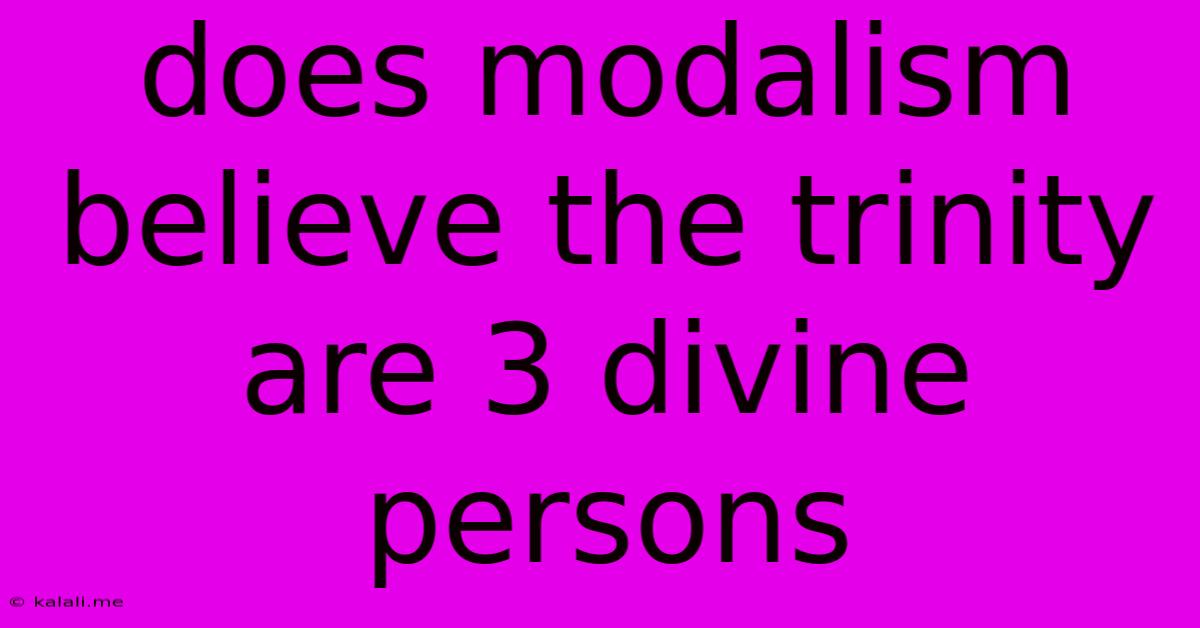Does Modalism Believe The Trinity Are 3 Divine Persons
Kalali
May 26, 2025 · 3 min read

Table of Contents
Does Modalism Believe the Trinity Are 3 Divine Persons? A Deep Dive into Modalistic Monarchianism
Modalism, also known as Modalistic Monarchianism, is a controversial theological viewpoint concerning the nature of the Trinity. It's a system of belief that directly challenges the traditional understanding of the Trinity held by most Christians. This article will explore the core tenets of Modalism and answer the central question: Does Modalism believe the Trinity are 3 divine persons? The short answer is no; Modalism fundamentally rejects the concept of three distinct divine persons within the Godhead.
Understanding the Traditional Trinitarian View
Before delving into Modalism, it's crucial to understand the orthodox Christian belief about the Trinity. This doctrine asserts that God exists as three co-equal, co-eternal persons: the Father, the Son (Jesus Christ), and the Holy Spirit. These three persons are distinct, yet they are one single essence or substance – the one true God. This is often summarized as "one God in three persons." This concept is considered a cornerstone of Christian theology, found in scripture and elaborated upon through centuries of theological discussion and interpretation.
The Modalistic View: One God, Three Modes
Modalism, in contrast, argues that God is one person who manifests himself in three different modes or roles – Father, Son, and Holy Spirit. These are not separate persons but different aspects or ways God reveals himself to humanity. Think of it like the sun: it has light, heat, and energy – all aspects of the same sun. In Modalism, the Father, Son, and Holy Spirit are not separate persons but different aspects or "modes" of the one divine being. This means that the Father is not eternally distinct from the Son or the Holy Spirit. Rather, the Father became the Son in the Incarnation and became the Holy Spirit during the Pentecost.
Key Differences and Challenges to Modalism
The core difference between the Trinitarian view and Modalism lies in the understanding of personhood. Trinitarianism affirms three distinct, yet united persons within the Godhead. Modalism, however, maintains that there is only one person who operates in different modes or roles.
Several significant challenges arise from the Modalistic perspective:
-
The Incarnation: If God is only one person manifesting in different modes, then the Incarnation – the belief that God became man in Jesus Christ – becomes problematic. How can a single person become another mode of himself? This leads to implications regarding the nature of Jesus' humanity and divinity.
-
Scriptural Interpretation: Critics argue that Modalism struggles to reconcile its tenets with numerous biblical passages that seem to explicitly point towards the distinct personhood of the Father, Son, and Holy Spirit. The distinct roles and interactions of the Trinity within the scriptures, particularly in the Gospels and the Book of Acts, pose a significant challenge to the modalistic interpretation.
-
Interpersonal Relationships within the Godhead: The Trinitarian doctrine emphasizes the relationship between the Father, Son, and Holy Spirit – their mutual love, obedience, and interaction. Modalism struggles to account for these relationships, reducing them to internal aspects of one divine being.
Conclusion: A Distinct Rejection of Three Persons
In conclusion, Modalism does not believe the Trinity are three divine persons. It posits a single divine person manifesting in three different modes or roles. This fundamentally differs from the traditional Trinitarian understanding of three co-equal, co-eternal persons in one God. While Modalism attempts to explain the complexity of God's nature, its limitations in addressing scriptural accounts and the interpersonal dynamics within the Godhead have led to its rejection by mainstream Christian denominations. The debate surrounding the Trinity remains a complex and crucial aspect of Christian theology.
Latest Posts
Latest Posts
-
Ubuntu Terminal Not Passing To Login Username And Password
May 27, 2025
-
How Long For A Hot Water Heater To Heat Up
May 27, 2025
-
How To Quit From Vi Editor In Linux
May 27, 2025
-
How To Remove Latex Paint From Carpet
May 27, 2025
-
The Wolves On The Walking Dead
May 27, 2025
Related Post
Thank you for visiting our website which covers about Does Modalism Believe The Trinity Are 3 Divine Persons . We hope the information provided has been useful to you. Feel free to contact us if you have any questions or need further assistance. See you next time and don't miss to bookmark.